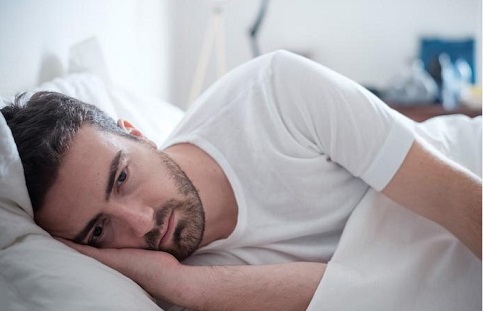Nikhil Prasad Fact checked by:Thailand Medical News Team Sep 26, 2024 7 months, 3 hours, 13 minutes ago
A new study conducted by researchers from various Italian universities highlights a growing concern: the quality of sleep among people who contracted COVID-19 has significantly worsened. The study, conducted in Southern Italy, aimed to assess how sleep patterns have changed post-COVID-19 infection. The researchers focused on understanding the relationship between mental health and sleep quality among individuals who had been infected with the virus. This Medical News report sheds light on the findings and the potential implications of poor sleep on overall well-being.
 Italian study finds that COVID-19 affects sleep quality
Thailand Medical News
Italian study finds that COVID-19 affects sleep quality
Thailand Medical News had previously covered studies that also showed that COVID-19 affects sleep quality and cause a variety of sleep related issues.
https://www.thailandmedical.news/news/covid-19-linked-to-increased-daytime-sleepiness-and-depression
https://www.thailandmedical.news/news/sars-cov-2-induced-gut-dysbiosis-possibly-behind-growing-cases-of-post-covid-insomnia
https://www.thailandmedical.news/news/swiss-doctors-warn-that-covid-19-can-cause-hypersomnia
https://www.thailandmedical.news/news/cleveland-clinic-study-finds-that-41-percent-of-individuals-with-long-covid-have-moderate-to-severe-sleep-disturbances
Sleep Quality After COVID-19
Researchers from the University of Campania “Luigi Vanvitelli,” the University of Catanzaro “Magna Graecia,” and the University of Calabria surveyed over 400 individuals who had recovered from COVID-19. They used a self-administered online questionnaire to gather data between March 2022 and January 2023. The results are startling, with a staggering 95.3% of participants reporting poor sleep quality, as measured by the Pittsburgh Sleep Quality Index (PSQI). The PSQI is a widely recognized tool used to assess sleep patterns, with a score of 5 or higher indicating poor sleep.
Mental Health Impact
This study also explored the mental health of participants, revealing extremely high levels of anxiety, stress, and depression among those surveyed. Specifically, 86% of participants reported severe anxiety, 77.2% experienced high levels of stress, and 71.1% were dealing with severe depression. The researchers found a strong correlation between these mental health issues and poor sleep quality.
Participants who scored high on the depression and stress scales were more likely to report poor sleep. This connection between mental health and sleep is not sur
prising, as previous research has shown that stress and anxiety can severely disrupt sleep patterns. However, the severity of the results in this study highlights the need for further research and potential intervention.
Key Findings
-Impact of COVID-19 Waves: Those who were infected during the first and second waves of the pandemic reported worse sleep quality compared to those who were infected later. This may be due to the uncertainty and fear that surrounded the initial outbreak of the virus, combined with the strict lockdowns and social distancing measures.
-Use of Sleep Medication: The study found that older individuals, those who had someone close to them die from COVID-19, and those who did not experience changes in their social relationships during the pandemic were more likely to use sleep medication. This suggests that the psychological toll of the pandemic may have led many to seek pharmaceutical solutions for their sleep problems.
-Daytime Dysfunction: The majority of participants (93.2%) reported trouble staying awake during the day, indicating that their sleep problems were affecting their daily lives. This is particularly concerning, as daytime dysfunction can lead to decreased productivity, accidents, and a lower quality of life.
Why This Matters
The high prevalence of sleep disturbances among individuals who had COVID-19 raises concerns about the long-term impact of the virus on mental and physical health. Sleep is crucial for the body’s ability to heal and function optimally. Poor sleep can weaken the immune system, exacerbate mental health issues, and increase the risk of chronic diseases such as hypertension, heart disease, and diabetes.
The study findings shed light on the fact that many individuals are still dealing with the aftermath of COVID-19 long after they have recovered from the infection. The long-term consequences of poor sleep and mental health problems may require public health interventions to support those affected.
Study Limitations
While the findings of this study are important, it is also essential to acknowledge some limitations. The data was collected through self-reported questionnaires, which can introduce bias. Participants may have over- or under-reported their sleep quality or mental health symptoms. Additionally, the study was conducted in a specific region of Italy, and the results may not be generalizable to other populations.
What Can Be Done?
The study suggests that more research is needed to understand the full extent of the impact of COVID-19 on sleep and mental health. It also highlights the importance of mental health support for those recovering from the virus. Simple interventions such as cognitive-behavioral therapy (CBT) for insomnia, stress management techniques, and sleep hygiene education could help improve sleep quality in affected individuals.
Conclusion
The findings of this study demonstrate the significant impact COVID-19 has had on sleep and mental health in Southern Italy. With 95.3% of participants reporting poor sleep quality and high levels of anxiety, stress, and depression, it is clear that the pandemic has left a lasting mark on those who were infected with the virus. These results underscore the need for continued research into the long-term effects of COVID-19 and for public health initiatives that address sleep and mental health issues.
Further research is required to determine whether these sleep disturbances persist as COVID-19 becomes endemic, and what additional factors might be contributing to the decline in sleep quality. For now, the results suggest that addressing the mental health and sleep issues of those who have had COVID-19 should be a priority for health professionals.
The study findings were published in the peer-reviewed journal: Frontiers in Psychiatry.
https://www.frontiersin.org/journals/psychiatry/articles/10.3389/fpsyt.2024.1428423/full
For the latest COVID-19 News, keep on logging to
Thailand Medical News.
Read Also:
https://www.thailandmedical.news/news/somnolence-and-shingles-seems-to-be-new-symptom-manifestation-of-covid-19-kp-3-and-lb-1-infections
https://www.thailandmedical.news/news/sars-cov-2-alters-brain-oxygen-levels-and-causes-sleepiness-and-attention-issues-in-post-covid-phase
https://www.thailandmedical.news/news/sleep-quality-s-impact-on-cognitive-recovery-post-covid-19 